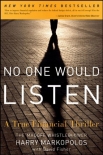No One Would Listen: A True Financial Thriller by Harry Markopolos (rainbow fish read aloud .txt) 📗

- Author: Harry Markopolos
Book online «No One Would Listen: A True Financial Thriller by Harry Markopolos (rainbow fish read aloud .txt) 📗». Author Harry Markopolos
A properly managed firm invests its clients’ money in a variety of financial products. The firm’s goal is to create a balanced portfolio that has the potential to earn substantial profits while being protected from any drastic losses. A conservative portfolio, for example, consists of about 60 percent equity—stocks—and 40 percent bonds. Frank would meet regularly with portfolio managers to see what kinds of investments they were looking for and try to fulfill those needs.
Like Neil and me, Frank was always looking to expand the number and quality of Rampart’s products. He had been hired because our two primary products, the Rampart Options Management System and a covered call writing program, had lost their sizzle and we needed something new to sell. So almost immediately he began trying to develop innovative ways to market our expertise. Among the products he and Neil worked on were principle-protected notes, which provide the chance of making a profit with the guarantee that you can’t lose the principle. Basically they involved using part of the investment to buy zero-coupon Treasury bonds, knowing the return over five or 10 years would equal the entire investment, and using the rest of the money to invest in hedge funds with leverage. The worst-case scenario was that after five or 10 years you’d get the original investment back but without any earnings. Basically, if the investment went south, the most a client could lose was the interest he or she would have made on the principle over five or 10 years. Frank’s plan was to have certain banks construct a blended pool of fund managers that could use the investment portion to produce something close to a 1 percent monthly return to the client, with the triple-A-rated bank guaranteeing the return of the original investment. Dave Fraley was supportive, telling Frank to try to build that part of the business. So Frank began prospecting institutions throughout New England, all the way into New York City.
The financial industry is a business of contacts and relationships. No one ever buys a product and says, “That product is the sexiest thing I’ve ever seen. I don’t care who’s selling it.” Generally people do business with people they trust and like, or people who are recommended by someone they trust. So like any good salesman, Frank was always looking for leads. He was constantly asking us who we knew at what firms. Who could we introduce him to? He used to complain that I never introduced him to my friends, and there was some truth to that. Finally, though, I referred Frank to my old friend Tim Ng, who was then a junior partner at a Madison Avenue fund of funds, Access International Advisors. Basically, Access was a hedge fund of funds whose investments were spread among several other hedge funds. It was what I always referred to as fighting size, meaning it managed more than $1 billion. I only found out later that almost all of its clients were European royalty or high-born old money.
As I told Frank, “I’ve heard from Tim Ng that his boss found a manager who’s putting out one to two percent a month or more net to client. Would that help you in building these principle-protected notes?”
The fact is that I was curious to see how this manager could consistently generate such a high return. Nobody ever beats the market month after month—nobody. The market can go up, remain neutral, or go down. There is no single strategy that provides a consistent return no matter what the market does. So I told Frank, “Why don’t you go down there and figure out what their game is?”
Frank wanted to know about this manager, too; if he really was that good, Frank could refer him to the banks that were building portfolios for Rampart. If he actually had discovered the holy grail, we could use him in our products.
They met in Access’s Madison Avenue office. Unlike so many of the elaborately decorated financial offices, this one was tastefully but simply decorated. It was an open plan, with steel desks side by side: a working office. Tim explained to Frank that he didn’t handle that side of the business and set up an appointment for him with the CEO of Access, a Frenchman named Thierry de la Villehuchet. Like Frank, I would eventually get to know and like Thierry very much. Rene-Thierry Magon de la Villehuchet was a terrific person, a French nobleman who, as it tragically turned out, truly was a noble man, a man of honor. He wasn’t an expert in financial math, but he was a great salesman. He and another Frenchman, Patrick Littaye, had founded Access. Both Thierry and Patrick had lived in the United States long enough to consider themselves Americans. They loved the American entrepreneurial spirit and considered themselves Americans in spirit. Thierry believed completely in American values. He took the Statue of Liberty very seriously. As Thierry once explained to me, in a French accent tempered by the years he’d lived here, “The French are socialists; we’re not socialists. Americans are capitalists; we’re capitalists. We believe in economic freedom; therefore we’re Americans.”
Thierry had a medium build, and everything about him was impeccable. He was always formal, always dressed in a suit and tie. The product he was marketing was himself, and he sold it well. I never knew precisely how old he was, but I guessed he was in his mid-50s when we





Comments (0)